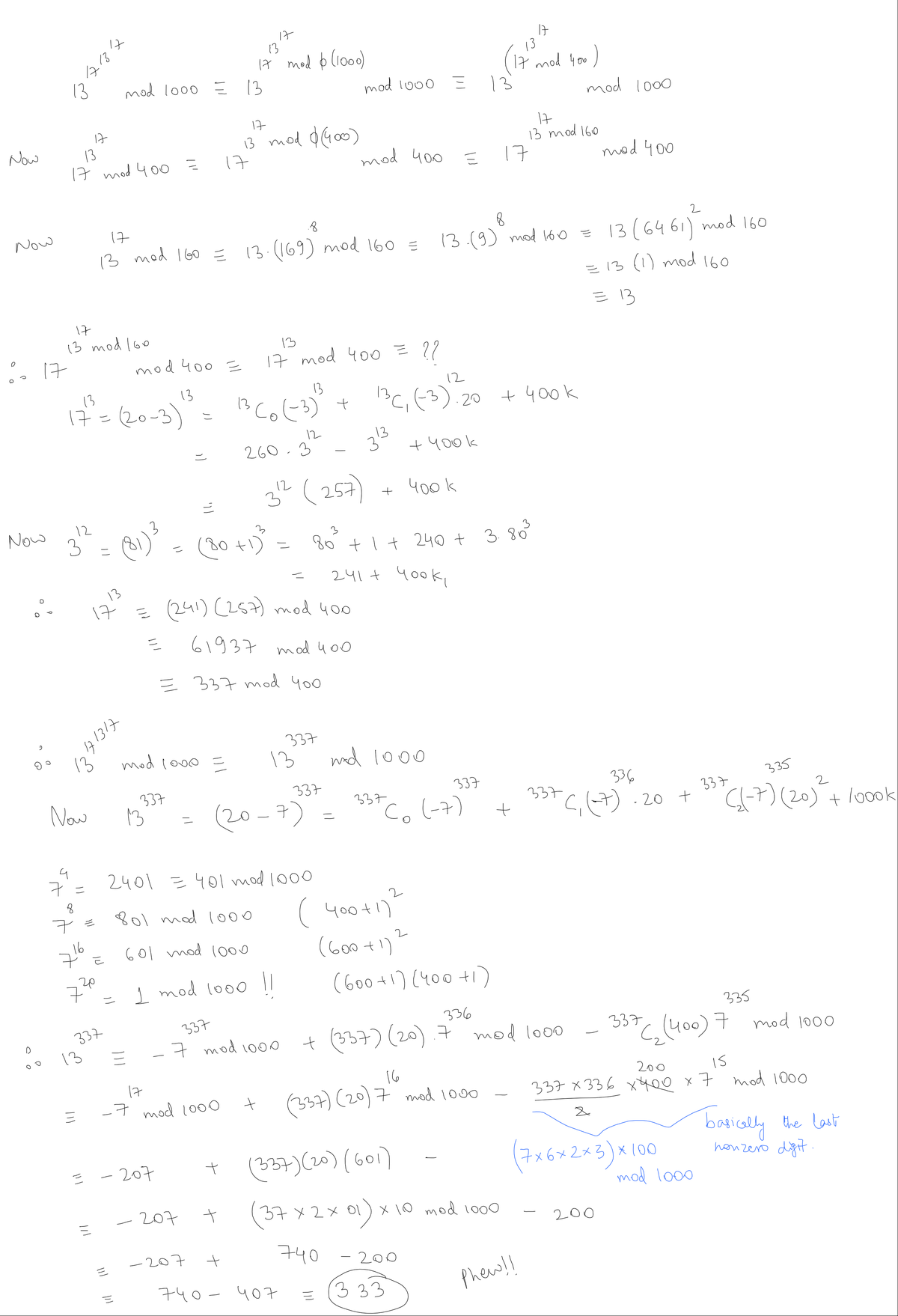Alternating prime tower
1 3 1 7 1 3 1 7
Find the last 3 digits of the number given above.
The answer is 333.
This section requires Javascript.
You are seeing this because something didn't load right. We suggest you, (a) try
refreshing the page, (b) enabling javascript if it is disabled on your browser and,
finally, (c)
loading the
non-javascript version of this page
. We're sorry about the hassle.
2 solutions

Yup this works!
Note that we can simplify the arithmetic greatly if we use Carmichael's lambda function in favor of Euler's totient function (as shown by Alan).
Log in to reply
I didn't know about Carmichael's lambda function. Had to work with the tools I had. :)
We'll be using the following theorem: let a , b , n ∈ N with g cd ( a , n ) = 1 , then a b ≡ a b m o d λ ( n ) ( m o d n ) . ( λ denotes the Carmichael function )
Let x = 1 3 1 7 1 3 1 7 , we want to find x m o d 1 0 0 0 . We have: x ≡ 1 3 1 7 1 3 1 7 m o d λ ( 1 0 0 0 ) ≡ 1 3 1 7 1 3 1 7 m o d 1 0 0 ( m o d 1 0 0 0 ) Let y = 1 7 1 3 1 7 , we have: y ≡ 1 7 1 3 1 7 m o d λ ( 1 0 0 ) ≡ 1 7 1 3 1 7 m o d 2 0 ( m o d 1 0 0 ) Let z = 1 3 1 7 , we have: z ≡ 1 3 1 7 m o d λ ( 2 0 ) ≡ 1 3 1 7 m o d 4 ≡ 1 3 1 ≡ 1 3 ( m o d 2 0 ) Finally reverse the steps: y ≡ 1 7 1 3 ≡ 1 7 3 × 4 + 1 ≡ 4 9 1 3 4 × 1 7 ≡ 1 3 4 × 1 7 ≡ 1 6 9 2 × 1 7 ≡ 6 9 2 × 1 7 ≡ 4 7 6 1 × 1 7 ≡ 6 1 × 1 7 ≡ 3 7 ( m o d 1 0 0 ) x ≡ 1 3 3 7 ≡ 1 3 3 × 1 2 + 1 ≡ 2 1 9 7 1 2 × 1 3 ≡ ( 1 9 7 2 ) 6 × 1 3 ≡ 3 8 8 0 9 6 × 1 3 ≡ ( 1 9 1 2 ) 3 × 1 3 ≡ 3 6 4 8 1 3 × 1 3 ≡ 4 8 1 2 × 4 8 1 × 1 3 ≡ 3 6 1 × 4 8 1 × 1 3 ≡ 6 4 1 × 1 3 ≡ 3 3 3 ( m o d 1 0 0 0 )
What's more interesting to note is that we can generalize this to:
Let q 1 = 1 3 1 7 and q n + 1 = 1 3 1 7 q n for n = 1 , 2 , … , then the last 3 digits of q 2 , q 3 , q 4 , … are all 333.
Log in to reply
Solve my problem: Alternating Palindrome Tower, to get another such interesting result.